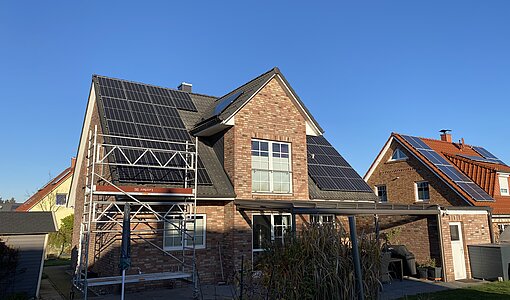Environmental protection - a new topic?
As early as the 1980s, environmental protection was a major issue. I can remember lessons in which we were encouraged to save water, the advantages of decentralised power generation were mentioned and of course problems such as the dying forest were also discussed. For far too long, nothing has changed much, and my generation will have to put up with one or two questions from future generations.
Quite self-critically, I have for far too long relied on large corporations installing filter systems, other countries following our example and separating waste and not seeing the problem so much on my doorstep. That was a mistake.
We are all challenged
If we all wait for the last polluter to see the light, it will be too late. But it is in all our interests to let this planet breathe a little air (quite literally). I have therefore decided to reduce my CO2 footprint - ideally to zero. How well I manage to do this, where it might be easy, where it might be difficult, this is an adventure I am embarking on and I will gladly report on it. I don't want to missionize anyone, but if someone feels addressed and wants to copy me or has ideas about what I could do better, I would be happy to hear from you.
My general conditions
I built a house with my wife a few years ago; even then we were concerned about climate protection and built a house that is well insulated and has advanced heating and hot water preparation (with heat pump). That helps of course. This home is set in any case and is not for sale.
My wife works in Lübeck, I work in Hamburg - which means I will have to commute further on. A certain part of my work I can also do in my home office, so a certain reduction is basically conceivable. But a lot of things work better when there are points of contact in the office, especially between teams and, to a certain extent, within the team I work in.
I'm a meat eater - and I like to eat meat. I am aware that my diet does cause problems. I am willing to pay even more attention to quality than before and also to set up meatless days; however, I am not (yet?) ready for the step of becoming a vegetarian.
I am aware that neither my life situation nor my efforts and conditions are representative for everyone.
I am basically trying to take measures that do not pave a new special path for me, but at least in principle could also work if everyone describes this path.
And - I am aware that I will not do everything right from the beginning. I am prepared to make mistakes and to correct the course where necessary.
Stocktaking
The database I use is the CO2 footprint calculator of the Federal Environment Agency. I have tried out some of them, which only differ in the details of the result. The calculator of the Federal Environment Agency breaks down the CO2 emissions for me meaningfully into sub-areas, each of which I can optimize for myself.
From a statistical point of view, it is difficult to distinguish between the personal and household CO2 footprint in all calculators. Thus, many personal questions are asked, but then mixed up with household issues (e.g. electricity consumption, living space and mobility). In the end a "personal footprint" is calculated.
So I did the CO2-calculator for each family member and added up the values for the household CO2 footprint.
As reference value I have taken the data from 2019. 2020 was an exception due to corona and due to the omission of the commuting distance over months no comparison. In addition, I already had good actual values for 2019 in the consumption data and did not have to estimate them.
status quo
The total household carbon footprint here of all persons and including actual car journeys made is 20.62 tonnes. Per capita, that is 6.87 tonnes of CO2 per year. On the one hand, this is not a very bad figure, because the average in Germany is 11.6 tonnes.
But it's also not a value we can rest on. The experts are pretty much in agreement that a footprint of 2 tons per person would be tolerable for our planet. So with almost 7 tons we are well above that.
I see little potential for optimization in electricity consumption. We have been using 100% green electricity for years. By the way, this is not as expensive as one might think. In this respect, for some people this may be a simple first step towards climate neutrality that doesn't even hurt that much.
We are also already well below the average for heating. When we built our house, we opted for an efficient geothermal heat pump, with which we are very satisfied. The geothermal heat pump is powered by electricity; the two-time tariff agreed for it was not available as a 100% eco-power variant, at least not at that time. By switching to green electricity for this contract as well, we could reduce our footprint by a good 1.5 tonnes.
The largest single item is - not surprisingly - mobility. Commuting from Lübeck to Hamburg is by far the largest single item. Since I cannot do without commuting in the future either, a solution must be found to this problem.
Limitations
It is immediately apparent from the basic data that a reduction to zero will not be possible. Even if I succeed in drastically reducing CO2 emissions from mobility and heating, I will still have to eat and get dressed - and I personally cannot directly influence the public emissions that do not directly accrue to me.
CO2 emissions, which I cannot avoid for whatever reason, will have to be offset in order to reduce my own footprint.
Compensate - how is that possible?
There are providers who have specialised in the compensation of CO2. Simply put, for a certain amount of CO2 you pay a corresponding amount, which is then used to carry out environmental protection projects.
When choosing an appropriate provider, it is important to ensure that additional and sustainable projects are financed. Atmosfair is a major player in this area and has performed well in tests so far.
What about holidays?
Holiday trips by car are already included in the mobility figures. Not included are air travel, which we certainly enjoy taking every few years. These flights cause a considerable peak in the respective year and should not be ignored. But it is an exception in our lives and we want to treat it as such. That means: If we consciously decide to take a trip by plane, we will compensate the flight as well.
Here we go
I want to significantly reduce my CO2 footprint as early as 2021 and become climate-neutral in the future. If you want to join me on this adventure and are interested in my progress and thoughts, I will report on this page.
If you have any ideas or are facing a similar task, I would be very happy to hear your comment or message.
Challenge: Climate neutrality.
I want to significantly reduce my CO2 footprint as early as 2021 and become climate neutral in the future. If you want to join me on this adventure and are interested in my progress and thoughts, I will report about it on this page.
If you have any ideas or are facing a similar task, I would be very happy to hear your comment or message.







Comments (0)
No comments found!